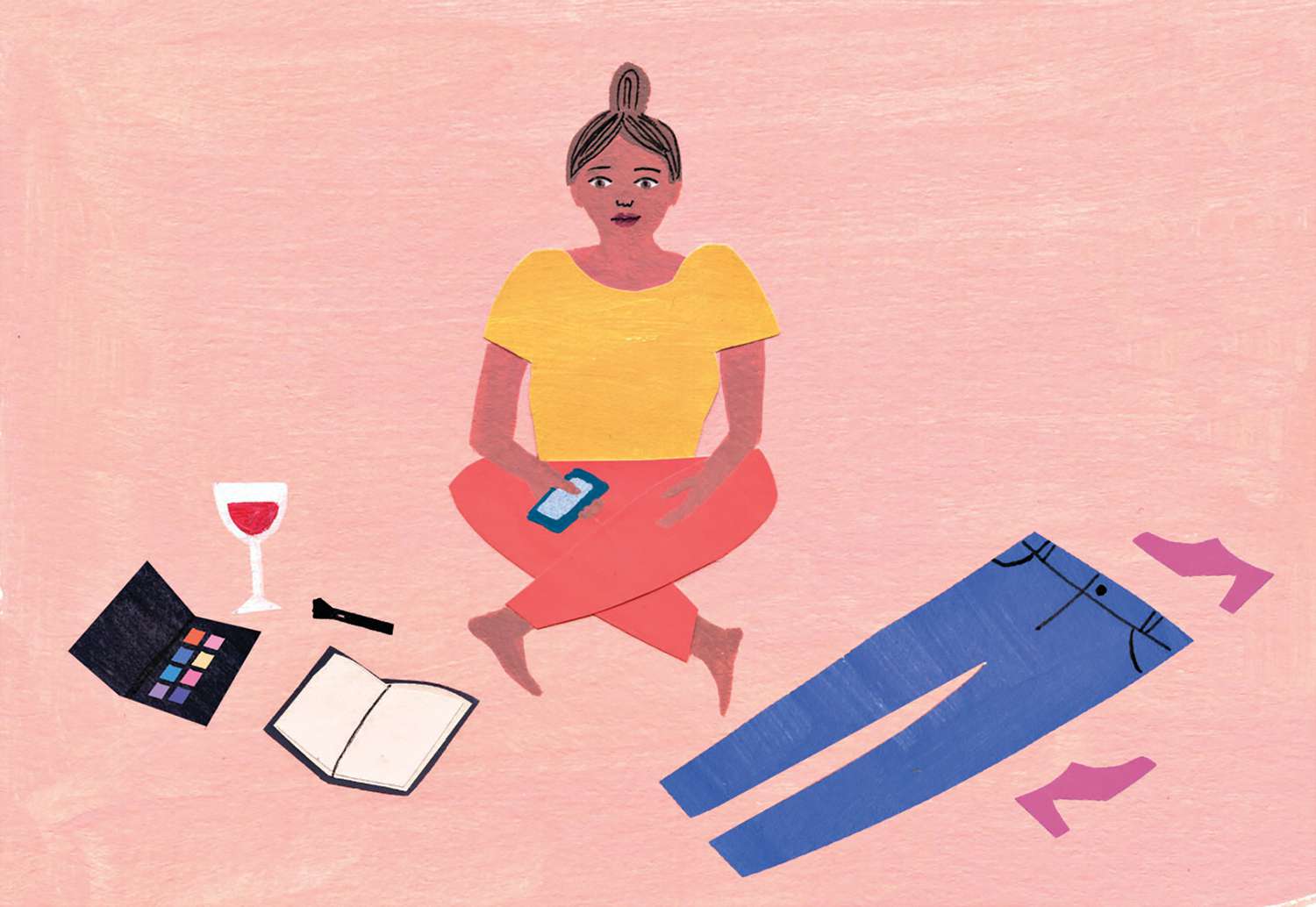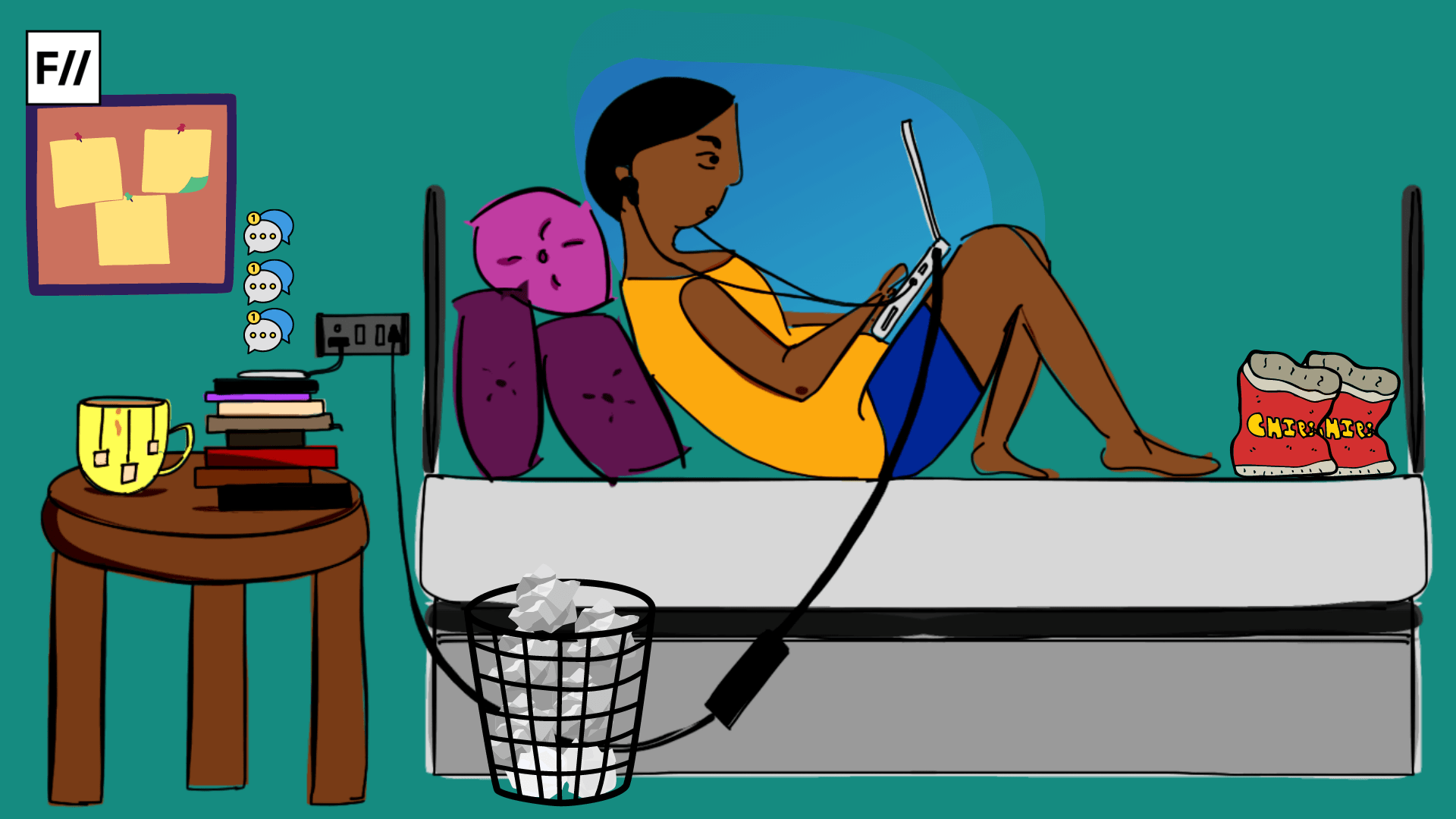Two years have passed since Covid-19 engulfed the way we live. Making sense of the pandemic has been difficult for me because making sense of anything means having expectations of it to simply pause. The vast multitude of time that I was required to spend by myself has only made me accept some things around me that I have no desire to admit.
Spaces like home, family, and neighborhood once held different meanings to me. They were things I returned to, things that gave me comfort, until the pandemic taught me that family could be exhausting, love could slacken, and that I could exist without any aspirations at all.
How does one exist in the present tense when it is that time of the year when everybody looks to the future? On New Year’s eve, we resolve to be better daughters and sons, better mothers and fathers, better persons than we were before. Why do we have this immense need to fix ourselves when the pandemic has turned our lives into plotless narratives?

In 2021, the main character trend on Tik-Tok dramatised the mundane moments of life, romanticising grocery runs, reading alone on the train, picking flowers from someone else’s yard to perch it over your ear. It felt like everyone had started to obsess over their own lives when the general orderliness of the world was disrupted by the pandemic. In some ways, I loved the notion of self-reflecting, of finding joy in my couch-bound life while the hair on my legs began to curl.
The main character energy meant that you define what success means to you and not others. You become the archetype hero of your own story, steering every moment of your life into narcissistic stories of success. It felt like an adequate coping mechanism for the pandemic-induced isolation. Soon, I found out that looking inward, self-reflecting and constantly obsessing over taking care of myself was more isolating than healthy. The more I tried to fix myself, the more problems I found.
Anjana says that she does notice an increase in anxiety among people and her clients close to holidays. It is a time we return home, to meet family and extended family and the unrealistic expectations that they hold for us. “New year signifies new beginnings and hope, yet, this is an arbitrary concept. We need to understand that we cannot change overnight”, says Anjana. The year 2021 has been a harsh challenge for everyone. We lost friends and family members to Covid, we found ourselves at the mercy of workplace and institutional lapses, missed exams, unexpected layoffs, anxiety, and depression
Anjana Moraes, a trauma-informed counseling psychologist based in Bangalore affirms that social media trends sometimes do promote hyper individualism that could become toxic and counterproductive. She says, “In this horrible capitalist system, we are encouraged to think only about ourselves. The truth is, we thrive when we depend on each other. Community and the feeling of belonging is crucial to our mental health”.
Hyper individualism is deeply connected to the hustle culture online. During the pandemic, it was said that the extreme, exhaustive work attitude is dwindling due to the closing of office spaces. This is far from the truth. Isolating with only social media to stimulate compels us to be constantly productive in order to have something to share.
The pictures and narratives of success on social media ask an oversharing of our hustle culture while the capability of accepting them to be fictional simply disappears. The fear of being left behind or being unproductive is so haunting that we constantly want to fix ourselves, straighten things up and make resolutions to hustle better the next year. The urge to do this heightens as we await a new year.
Also read: ‘We Are Destined To Find Our Own, Steadying Rhythm’: Being A Reluctant Adult Amidst A Pandemic

Anjana says that she does notice an increase in anxiety among people and her clients close to holidays. It is a time we return home, to meet family and extended family and the unrealistic expectations that they hold for us. “New year signifies new beginnings and hope, yet, this is an arbitrary concept. We need to understand that we cannot change overnight”, says Anjana. The year 2021 has been a harsh challenge for everyone. We lost friends and family members to Covid, we found ourselves at the mercy of workplace and institutional lapses, missed exams, unexpected layoffs, anxiety, and depression.
The pandemic has been on for so long that demarcating its end is a blurry distant future tense. Historically, new year is seen to be an extrinsic motivator for new beginnings. But how does one navigate this time of the year when survival is immediate than thriving?
In the novel Drifts, by Kate Zambreno, the author narrates the struggle of keeping herself productive and the difficulty of living in the present tense. Drifts is a memoir of Zambreno in the process of writing the novel. In another sense, the book is the perfect pandemic novel of being locked in with nothing but your own self to be the muse that quickly becomes vile and isolating.
Kate Zambreno narrates her slow slips at being productive, writing and dreaming of a full-time job, tenure, accompanied by cat-watching in her neighborhood. She writes, “I masturbate throughout the day, so much that I pull a muscle in my writing hand, which makes me feel like Robert Walser”. Her editor asks why the protagonist is masturbating to which Zambreno says, it is because “she has the time”. What Kate Zambreno essentially pokes at is the failed attempts at completing her novel, the annoyance of time wasted and the time she does not know what to do with. At one point, she asks the reader, is there a way to fold time into a book?

My incessant text messages to my friends about failing a job interview, homebound life, the time I waste everyday, my quick descent into being domesticated by my mother, all come back with the same WhatsApp notification, ‘Your body survived a pandemic. Be more kind to it’. All of this makes me feel like I should have never shared too much of myself in the first place. How come I was never taught to make all my resolutions to be secrets, fail to achieve them in solitude, move on, and rebuild without telling anyone?
I guess the social connections we make online compulsorily ask of us a laborious sharing of ‘so, what have you been up to lately?’ and then, the quick dissolution of mental health follows.
In one of his letters to Clara Westoff, the poet Rainer Maria Rilke writes, “One lives so badly because one always comes into the present unfinished, unable, distracted”. This new year, it is essential for us to remember how frail our lives actually are, and to reckon that all of us are locked in a struggle with the present. To drift slowly, taking time in bit by bit, is quite okay
I asked K L Niharika, counseling psychologist and founder of Psinkin, if social media compels us to overshare to an extent that we lose grasp of ourselves. Niharika says, “It is not true that social media compels us to do anything, but the tendency to share our information in a beautiful manner, get likes and impressions is a form of validation seeking”. She gives me a real-life example, “parents ask their children to perform, tell rhymes and sing in front of others. That is one of the most common examples of how people tend to seek validation”.
The problem here is that the validation we receive through social media and in such similar life events could sometimes be mistaken as self-worth. She further explains, “Social media is not the cause, but is the result. To build self-esteem, keeping information private is not really enough, but one has to learn to share both achievements and failures, happiness and sadness, health and illness”.

The Covid years have taught us the importance of mental health and the need to be connected with others. Whether these connections are made through texts, letters, waves, or wink-smiles underneath a mask, it is clear that the coming year requires resolutions that are empathetic not just to others but ourselves.
In one of his letters to Clara Westoff, the poet Rainer Maria Rilke writes, “One lives so badly because one always comes into the present unfinished, unable, distracted”. This new year, it is essential for us to remember how frail our lives actually are, and to reckon that all of us are locked in a struggle with the present. To drift slowly, taking time in bit by bit, is quite okay.
Also read: Saying Goodbye To 2021: ‘Mad Heart Cry, But Don’t Break!’
Featured Image: Ritika Banerjee for Feminism In India
About the author(s)
Sharon is a staff writer for FII.




